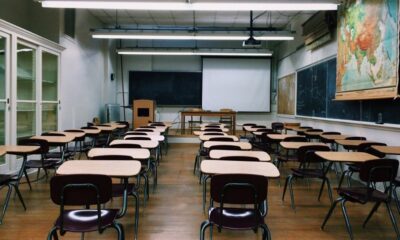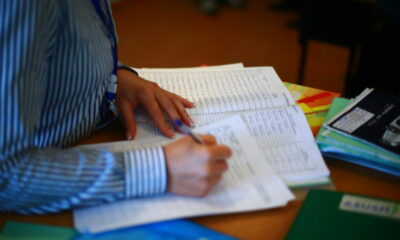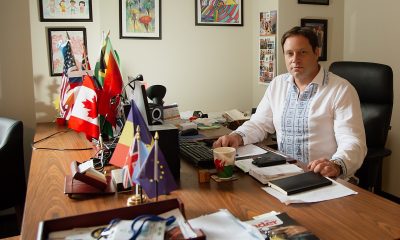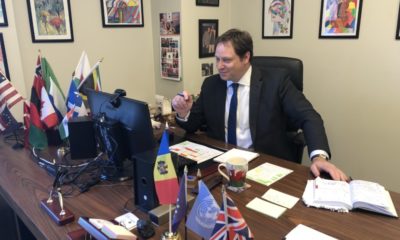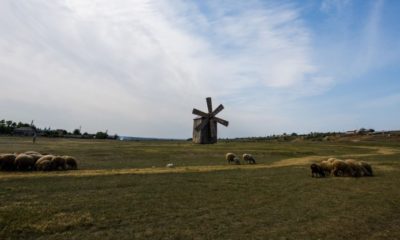Society
Interview with Heritage director, Robert Ford: ”A society investing in education lays the foundation for prosperity, peace and ability to face the challenges of the future”
What made you take up educational work? Give us your essential bio.
Like all good teachers, it was the influence of a number of great teachers I was fortunate enough to be taught by as a student that not only gave me a passion for subjects like History, Sport, Literature, Maths, Science, Art, Design, but also showed to me the transformative and aspirational power of learning and knowledge. The intellectual curiosity that was such a strong feature of my school and my university is something that has made my sense of the world and my place in it something I want to pass onto my students and my own children. This September it will be 25 years since I left university in York and began teaching at an incredibly inspiring international school in that ancient city in the north of England, and for my entire career it has always been an absolute privilege to work with young people and to work with school communities. Education is the ultimate public good and for any society having belief in young people and investing in education lays the foundation for prosperity, peace and being able to face the challenges of the future. I come from a working-class background in the UK, from the very beautiful border country of England and Wales, so I know the importance of identity, hard work, education and aspiration.
Connecting classrooms across the world has been such a joy to be involved with as a career and vocation. I have been involved with the UK government’s outstanding world-renown organisation, the British Council, for nearly 20 years and have advised and spoken at conferences for schools, school boards and ministries throughout the world. In May of this year, I gave evidence in the UK Houses of Parliament to MPs and Lords about global education as only one of two school leaders to be asked to come to London. I have set up the International Baccalaureate in a number of international schools, advised especially in the USA, and established the group of schools in the South West of England as the first chair. I have contributed a number of articles and pieces for books on international education, leadership and curriculum to publications.
I am very proud of the four years I was principal of Wyedean School, the writer J. K. Rowling’s former school, in the UK, where together with a brilliant team of colleagues, students and a wider community we transformed the school to be one of the leading schools in the UK, known for our innovation in digital, global, creative and sustainable learning.
In what way did Heritage and Moldova appeal to you and why did you accept the challenge of relocating and work in the local educational system?
I have worked with countries from Eastern Europe for a number of years, probably around 20, and one of my first successes was in the late 1990s and early Millennium, working with schools in Russia. It’s always part of my mentality as a student of history and politics to see what we have in common as a continent rather than the artificial differences. I started working with educators and schools from Moldova about 6 years ago. I was really impressed by the students and teachers, that strong Moldovan commitment to education and the power of transformation and opportunity through learning. The high standards, especially around language learning, was something I envied where in the UK learning a second language is in such decline.
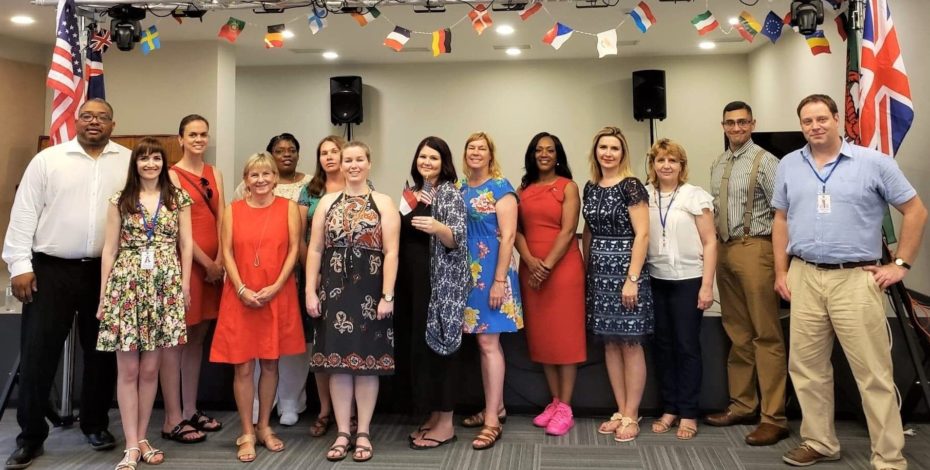
I knew Heritage International School from when it started in 2017 because of working with colleagues and students there on eTwinning projects and we were skyping between the UK and Moldova almost weekly. The vision of the founders to have a truly international school in Moldova appealed to me immediately. The impact of having a world-class school in the country and the development of future leaders is an incredible responsibility. There is a strong sense of duty from the founders in the vision for the school, especially at a time when migration, giving young people a stake in their country is vital and the question of identity and a globalised world is something our young people need to balance in their beliefs. It is similar to the national mission in countries like Ireland and Wales. Having a school committed to international education and international curricula can benefit everyone and it was a virtual no brainer not to work in such an organisation. It is a privilege to lead our fantastic school community.
What do you think is your role as the Director of Heritage International School and what is the school mission under your leadership?
Leadership can be interpreted in many ways, often in a school it is seen as a managerial role as opposed to a strategic leadership role. I have worked with school systems around the world where the national context often means there isn’t really leadership in the organisation and therefore ideas, innovation and development of future leaders and teams doesn’t happen, to the detriment of the organisation. I believe completely in people – staff and students. I am an ardent advocate of servant leadership, trust in people, developing people and teams, distributing leadership, humility in leadership and being prepared to own mistakes and to say when you are wrong. Learning only happens when we reflect on the experience and often the failures. My role is to lead the school community and be a visible sign of our international school ethos and culture, to use my experience and strategy to truly make Heritage International School an outstanding world-class school where students and potential staff are queueing to get in because they want to be a part of our success story. My role, now that the school is established and underway, is to take it to the next level and so we stand out as something good and decent in education for our communities and country, to be proud of the educational values and culture we represent.
Heritage has already taken its place as a prestigious international school and the only Cambridge School in the country. What are the directions for development at Heritage for the next school year in terms of academic work, curricular and extracurricular activities?
As we go onto our third year we need to consolidate as a school the great work we have made in the first two years. We are thrilled to have been able to recruit both locally and internationally, teachers who want to work in Moldova and at Heritage International School. We have to continue to define and shape ourselves as an outward facing school. We are not too far away from our new Lyceum starting and we are involved in discussions with the International Baccalaureate Organisation who want to support us directly in getting the IB to Moldova and this really would put us on the map in a network of 5000 of the very international schools around this world. The continuing collaboration in our wider global networks of schools and organisations such as the brilliant work we have with America House and the British Council, gathers pace and more sophistication going into the new school year. Our primary school is looking at the further development of the International Primary Curriculum with colleagues working with established partner schools in Romania and the UK. Our new student support centre is going to provide innovative pastoral care and developed approaches to student wellbeing, befitting an international school going into the 2020s. We will also be continuing with our focus on STEM and looking to bring into school more opportunities for Coding and Cyber education.
We want to also look at how we can engage our school in our local communities further and part of this is using our values in our “GO Heritage” social responsibility programme to support local schools and projects. The principal of Somerville College, University of Oxford, Baroness Jan Royall, has extended a personal invitation to our older students to spend time in Oxford University, this is the college Margaret Thatcher went to, and we will be taking the offer of the UK Houses of Parliament to visit Westminster and London. Making more opportunities such as these, that will transform lives is the name of the game in our approach towards the holistic curriculum. Engaging with the wider world from Moldova through these opportunities is not only the ambition of any international school but it is the hallmark of the very best. We are looking to the programme of outside speakers coming into Heritage International School to share the vast array of experience we have in our wider school community and part of preparing our young people for the 21st century world is not to have education in an abstract bubble.
What makes Heritage stand out and why should parents enrol their children in the school?
At Heritage International School, our education is lighting the fires of imagination, intellectual curiosity and opening ambitions and aspirations in our brilliant young people every day. There is nothing ordinary or mundane about our education here at Heritage. We have high standards of learning and the trust of a young person’s education and development is something we don’t compromise on as a school. They have one chance at education as a child.
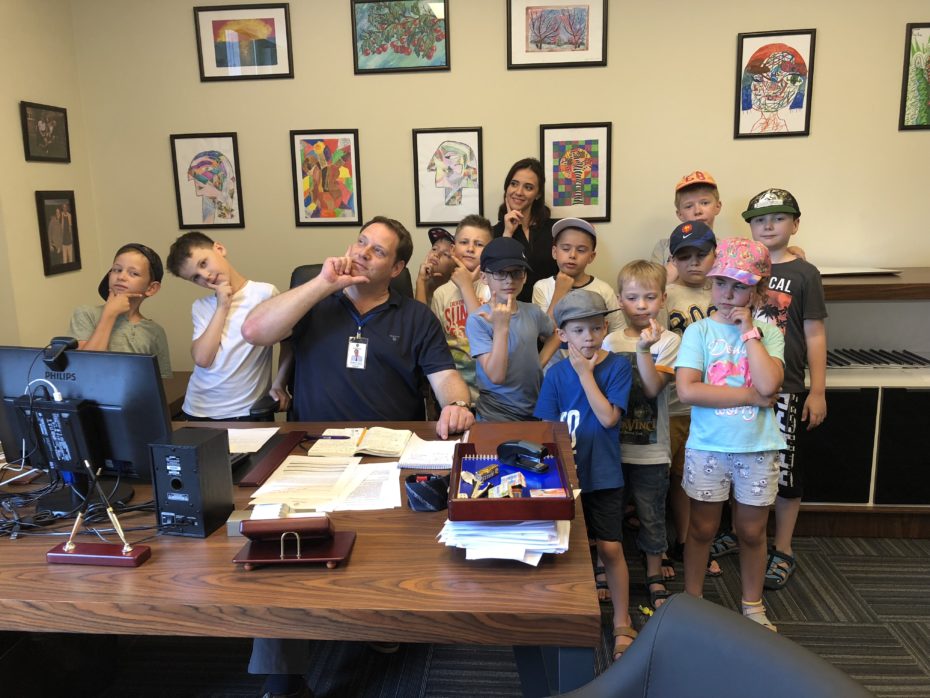
Open Day at Heritage International School is every day and my team and I invite any potential student and their family to visit our incredible school, meet with our staff and students and come to see the power of our learning and international education. Come and see what we are all about.
If you want your child to be balanced, positive about school and enjoying learning, to be a global citizen and proud of their identity & community and to be able to study, work, live and access the world, then Heritage is for you. If you want your child to be stretched and challenged in their learning in a positive school culture and respectful learning environment that allows them to progress through educational experiences, to study in the very best of international curricula, then our school is for you. If you have a high ambition for your child to be immersed in a school with a global education ethos and values, that nurtures and cares for every individual, believing in them and the possibility of transformative learning opportunities through outstanding teachers, all within a professional world-class, purpose-designed, 21st century new school, then Heritage International School is for you. If you want the very best international education for your children, then Heritage is the school for you.
The future begins here!
Please see the full version of the interview here: http://heritage.md/ro/noutati/interview-with-heritage-director-robert-ford/
Society
“They are not needy, but they need help”. How Moldovan volunteers try to create a safe environment for the Ukrainian refugees

At the Government’s ground floor, the phones ring constantly, the laptop screens never reach standby. In one corner of the room there is a logistics planning meeting, someone has a call on Zoom with partners and donors, someone else finally managed to take a cookie and make some coffee. Everyone is exhausted and have sleepy red eyes, but the volunteers still have a lot of energy and dedication to help in creating a safe place for the Ukrainian refugees.
“It’s like a continuous bustle just so you won’t read the news. You get home sometimes and you don’t have time for news, and that somehow helps. It’s a kind of solidarity and mutual support,” says Vlada Ciobanu, volunteer responsible for communication and fundraising.
The volunteers group was formed from the very first day of war. A Facebook page was created, where all types of messages immediately started to flow: “I offer accommodation”, “I want to help”, “I want to get involved”, “Where can I bring the products?”, “I have a car and I can go to the customs”. Soon, the authorities also started asking for volunteers’ support. Now they all work together, coordinate activities and try to find solutions to the most difficult problems.
Is accommodation needed for 10, 200 or 800 people? Do you need transportation to the customs? Does anyone want to deliver 3 tons of apples and does not know where? Do you need medicine or mobile toilets? All these questions require prompt answers and actions. Blankets, sheets, diapers, hygiene products, food, clothes – people bring everything, and someone needs to quickly find ways of delivering them to those who need them.
Sometimes this collaboration is difficult, involves a lot of bureaucracy, and it can be difficult to get answers on time. “Republic of Moldova has never faced such a large influx of refugees and, probably because nobody thought this could happen, a mechanism of this kind of crisis has not been developed. Due to the absence of such a mechanism that the state should have created, we, the volunteers, intervened and tried to help in a practical way for the spontaneous and on the sport solutions of the problems,” mentions Ecaterina Luțișina, volunteer responsible for the refugees’ accommodation.
Ana Maria Popa, one of the founders of the group “Help Ukrainians in Moldova/SOS Українці Молдовa” says that the toughest thing is to find time and have a clear mind in managing different procedures, although things still happen somehow naturally. Everyone is ready to intervene and help, to take on more responsibilities and to act immediately when needed. The biggest challenges arise when it is necessary to accommodate large families, people with special needs, for which alternative solutions must be identified.
Goods and donations
The volunteers try to cope with the high flow of requests for both accommodation and products of all kinds. “It came to me as a shock and a panic when I found out that both mothers who are now in Ukraine, as well as those who found refuge in our country are losing their milk because of stress. We are trying to fill an enormous need for milk powder, for which the demand is high and the stocks are decreasing”, says Steliana, the volunteer responsible for the distribution of goods from the donation centers.
Several centers have been set up to collect donations in all regions of Chisinau, and volunteers are redirecting the goods to where the refugees are. A system for processing and monitoring donations has already been established, while the volunteer drivers take over the order only according to a unique code.
Volunteers from the collection centers also do the inventory – the donated goods and the distributed goods. The rest is transported to Vatra deposit, from where it is distributed to the placement centers where more than 50 refugees are housed.
When they want to donate goods, but they don’t know what would be needed, people are urged to put themselves in the position of refugees and ask themselves what would they need most if they wake up overnight and have to hurriedly pack their bags and run away. Steliana wants to emphasise that “these people are not needy, but these people need help. They did not choose to end up in this situation.”
Furthermore, the volunteer Cristina Sîrbu seeks to identify producers and negotiate prices for products needed by refugees, thus mediating the procurement process for NGOs with which she collaborates, such as Caritas, World Children’s Fund, Polish Solidarity Fund, Lifting hands, Peace Corps and others.
One of the challenges she is facing now is the identifying a mattress manufacturer in the West, because the Moldovan mattress manufacturer that has been helping so far no longer has polyurethane, a raw material usually imported from Russia and Ukraine.
Cristina also needs to find solutions for the needs of the volunteer groups – phones, laptops, gsm connection and internet for a good carrying out of activities.
Hate messages
The most difficult thing for the communication team is to manage the hate messages on the social networks, which started to appear more often. “Even if there is some sort of dissatisfaction from the Ukrainian refugees and those who offer help, we live now in a very diverse society, there are different kind of people, and we act very differently under stress,” said Vlada Ciobanu.
Translation by Cătălina Bîrsanu
Important
#WorldForUkraine – a map that shows the magnitude of the world’s actions against Russian aggression

The international community and volunteers from all over te world have launched #WorldForUkraine as a platform that shows the magnitude of the world’s actions against the Russian aggression. In a digital world – it is an interactive map of public support of Ukrainians under the hashtag #WorldForUkraine – rallies, flash mobs, protests around the world. In the physical dimension – it is your opportunity to take to the streets and declare: “No to Putin’s aggression, no to war.”
„Today, along with the political and military support, emotional connection with the civilized world and truthful information are extremely important for Ukraine. The power to do it is in your hands. Join the #WorldForUkraine project and contribute to the victorious battle against the bloodshed inflicted on Ukraine by the aggression of the Russian Federation”, says the „about the project” section of the platform.
Go to the streets — Tell people — Connect and Unite — Become POWERFUL
Volunteers have launched #WorldForUkraine as a platform that shows the magnitude of the world’s actions against Russian aggression. In digital world – it is an INTERACTIVE MAP of public support of Ukrainians worldforukraine.net under the hashtag #WorldForUkraine – rallies, flash mobs, protests around the world. In the physical dimension – it is your opportunity to take to the streets and declare: “No to Putin’s aggression, no to war.” There you may find information about past and future rallies in your city in support of Ukraine. This is a permanent platform for Ukrainian diaspora and people all over the world concerned about the situation in Ukraine.
So here’s a couple of things you could do yourself to help:
* if there is a political rally in your city, then participate in it and write about it on social media with geolocation and the hashtag #WorldForUkraine
* if there are no rallies nearby, organize one in support of Ukraine yourself, write about it on social media with geolocation adding the hashtag #WorldForUkraine
The map will add information about gathering by #WorldForUkraine AUTOMATICALLY
Your voice now stronger THAN ever
All rallies are already here: https://worldforukraine.net
Important
How is Moldova managing the big influx of Ukrainian refugees? The authorities’ plan, explained

From 24th to 28th of February, 71 359 Ukrainian citizens entered the territory of Republic of Moldova. 33 173 of them left the country. As of this moment, there are 38 186 Ukrainian citizens in Moldova, who have arrived over the past 100 hours.
The Moldovan people and authorities have organized themselves quickly from the first day of war between Russia and Ukraine. However, in the event of a prolonged armed conflict and a continuous influx of Ukrainian refugees, the efforts and donations need to be efficiently managed. Thus, we inquired about Moldova’s long-term plan and the state’s capacity to receive, host, and treat a bigger number of refugees.
On February 26th, the Ministry of Labor and Social Protection of Moldova approved the Regulation of organization and functioning of the temporary Placement Center for refugees and the staffing and expenditure rules. According to the Regulation, the Centers will have the capacity of temporary hosting and feeding at least 20 persons, for a maximum of 3 months, with the possibility of extending this period. The Centers will also offer legal, social, psychological, and primary medical consultations to the refugees. The Center’s activity will be financed from budget allocations, under Article 19 of Provision no. 1 of the Exceptional Situations Commission from February 24th, 2022, and from other sources of funding that do not contravene applicable law.
The Ministry of Inner Affairs and the Government of Moldova facilitated the organization of the volunteers’ group “Moldova for Peace”. Its purpose is to receive, offer assistance and accommodation to the Ukrainian refugees. The group is still working on creating a structure, registering and contacting volunteers, etc. It does not activate under a legal umbrella.
Lilia Nenescu, one of the “Moldova for Peace” volunteers, said that the group consists of over 20 people. Other 1700 registered to volunteer by filling in this form, which is still available. The group consists of several departments:
The volunteers’ department. Its members act as fixers: they’re responsible for connecting the people in need of assistance with the appropriate department. Some of the volunteers are located in the customs points. “The Ministry of Inner Affairs sends us every day the list of the customs points where our assistance is needed, and we mobilize the volunteers”, says Lilia Nenescu.
The Goods Department manages all the goods donated by the Moldavian citizens. The donations are separated into categories: non-perishable foods and non-food supplies. The volunteers of this department sort the goods into packages to be distributed.
The Government intends to collect all the donations in four locations. The National Agency for Food Safety and the National Agency for Public Health will ensure mechanisms to confirm that all the deposited goods comply with safety and quality regulations.
The Service Department operates in 4 directions and needs the volunteer involvement of specialists in psychology, legal assistance (the majority of the refugees only have Ukrainian ID and birth certificates of their children); medical assistance; translation (a part of the refugees are not Ukrainian citizens).
According to Elena Mudrîi, the spokesperson of the Ministry of Health, so far there is no data about the number of Covid-19 positive refugees. She only mentioned two cases that needed outpatient medical assistance: a pregnant woman and the mother of a 4-day-old child.
The Accommodation Department. The volunteers are waiting for the centralized and updated information from the Ministry of Labor about the institutions offering accommodation, besides the houses offered by individuals.
The Transport Department consists of drivers organized in groups. They receive notifications about the number of people who need transportation from the customs points to the asylum centers for refugees.
The municipal authorities of Chișinău announced that the Ukrainian children refugees from the capital city will be enrolled in educational institutions. The authorities also intend to create Day-Care Centers for children, where they will be engaged in educational activities and will receive psychological assistance. Besides, the refugees from the municipal temporary accommodation centers receive individual and group counseling.
In addition to this effort, a group of volunteers consisting of Ana Gurău, Ana Popapa, and Andrei Lutenco developed, with the help of Cristian Coșneanu, the UArefugees platform, synchronized with the responses from this form. On the first day, 943 people offered their help using the form, and 110 people asked for help. According to Anna Gurău, the volunteers communicate with the Government in order to update the platform with the missing data.
Translation from Romanian by Natalia Graur


